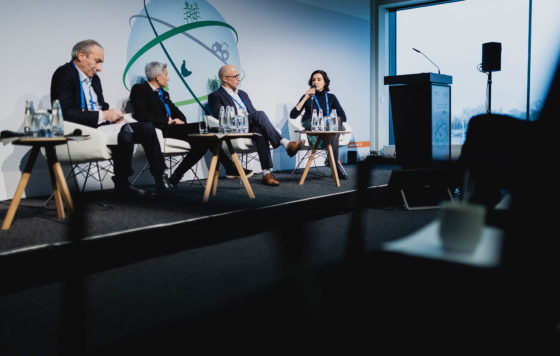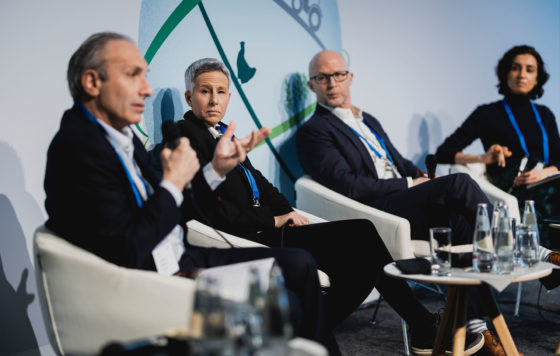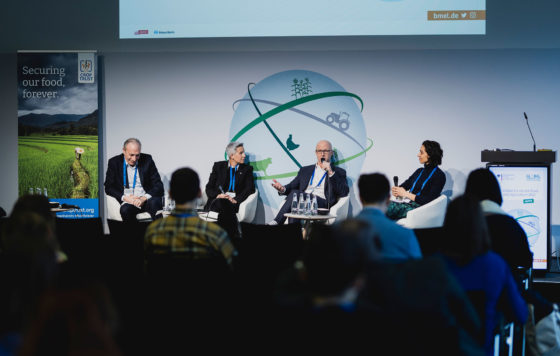Diversity for Resilient Food Systems
The Global Crop Diversity Trust (Crop Trust)
Time: Friday, 20. January 2023, 09:30 a.m. – 11:00 a.m.
Room: M2-M3
Languages: English, German
Summary:
The expert panel featured a keynote speech held by Dr. Stefan Schmitz, Executive Director of the Crop Trust, and a panel discussion with Lawrence Haddad (GAIN), Brent Loken (WWF), Sharon Cittone (Edible Planet Ventures) and Jaspreet Stamm (Crop Trust).
In his keynote, Dr. Schmitz outlined the importance of crop diversity in adapting to changing environments, increasing crop yields and quality, and helping farmers control pests and diseases. Dr. Schmitz’s recommendations for food systems transformation included recognizing crop diversity as a global common good, building a global system for conservation, providing more substantial financial support, strengthening links between genebanks and researchers and increasing the use of neglected crops.
In the discussion, the panelists agreed on an urgent need to start pivoting from the optimization of the agricultural system to the diversity of solutions available for transforming food systems in different parts of the world. They highlighted the importance of place-based strategies and innovations and the power young people could bring into the mindset shift needed for food system transformation. Due to the diverse solutions available, a higher level of collaboration between actors is also necessary.
The session concluded with a Q&A that focused on the role of the private sector in supporting more diverse farming practices and the importance of collaboration between multiple stakeholders for successful food systems transformation.
Keynote speaker
He previously worked as Deputy Director-General and Commissioner for the “One World – No Hunger” Initiative at the German Federal Ministry for Economic Cooperation and Development (BMZ). He also chaired the Steering Committee of the Global Agriculture and Food Security Program (GAFSP).
For more than 10 years, Stefan was leading the food security, agriculture and rural development work at BMZ. From 2007 until 2009 he worked as senior advisor to the Secretariat of the Organization for Economic Cooperation and Development (OECD) in Paris. Before joining the BMZ in 2001, Stefan held various posts in the German federal administration in the fields of geographical information systems, regional planning and international cooperation on urban issues.
He received scholarships of the McCloy Fellowship of the American Council on Germany and of the German Academic Exchange Service. After studying in Bonn and St. Andrews, he graduated from Bonn University in geography and mathematics and received a doctorate in geosciences from the Free University of Berlin in 2000.
Panel Guests
Previously, Brent worked for EAT, the science-based global platform for food system transformation, where he was a lead author on the EAT-Lancet report on Food, Planet, and Health. His past research includes a variety of publications ranging from subjects on food and health to orangutan terrestriality and tropical forest governance.
His current work includes a report on food consumption patterns in G20 countries and the potential for reducing greenhouse gas emissions, a series of papers that develop national-level roadmaps on GHG mitigation potential from changes in food and agriculture, and an analysis on how sustainable logging in a tropical forest impacts biodiversity.
In addition, Brent co-founded and helped lead a progressive international school and co-founded a conservation NGO that focused on protecting rainforests and biodiversity by empowering indigenous peoples. Rarely patient, Brent believes to achieve the SDGs and Paris Agreement in the short time that is available it will be because of fast-moving and innovative organizations and people that disrupt the status quo and actively show the world a more healthy and sustainable way of living in harmony with nature.
As part of Global Science, Brent is bridging the technical and conservation practice worlds, synthesizing information from a wide range of food, agriculture, nutrition, and environment disciplines for their creative application to the global nature agenda.





